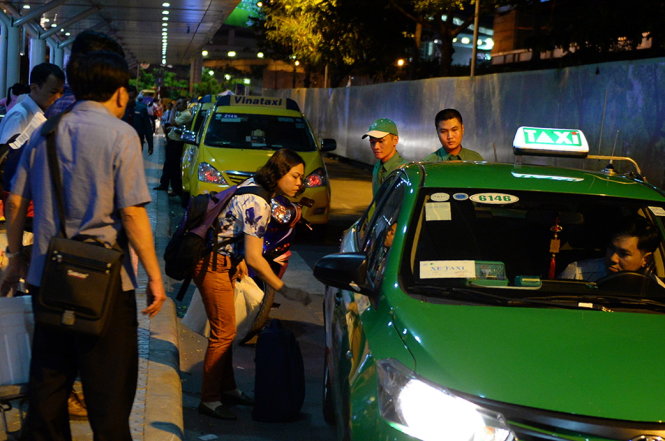While Vietnam’s traditional taxi firms have been lamenting unfair competition from tech-based rivals Uber and Grab, experts are advising they use the opportunity to focus on identifying areas for self-improvement to win back customers.
As with most traditional taxis, customers in Vietnam must call the company’s hotline to hail a cab and later pay what the meter reads.
These traditional taxi services are losing their competitive edge against more modern competitors that allow everything to be done at cheaper prices via a smartphone app.
While it cannot be denied that conventional taxis are facing unhealthy competition from Uber, Vietnamese cab operators must focus on improving their services in order to boost competitiveness instead of complaining or waiting for regulatory intervention, industry insiders said at a seminar on Thursday.
The event in Ho Chi Minh City saw representatives from Mai Linh, one of Vietnam’s leading taxi firms, the city’s transport department and taxi association, and transportation experts discuss ways to help conventional taxis survive the invasion of tech-based competitors.
As of the beginning of this year, there were more than 10,750 taxis operating in Ho Chi Minh City, accounting for 41 percent of the city’s public transportation.
The Ho Chi Minh City Taxi Association said the real number of taxi passengers is much higher, given some 4,000 unlicensed cabs, which are preferred by customers for their cheap prices.
“Traditional taxis are suffering unfair competition from Uber,” Ta Long Hy, the association’s chairman, said at the seminar.
Hy added conventional taxis have to meet numerous requirements and pay myriad taxes and fees, a burden that Uber drivers do not bear.
“The operator of Uber ‘taxis’ does not have to pay taxes or buy insurance for the drivers and the vehicles can operate under no regulations,” he elaborated.
“Uber can offer cheap prices to attract riders, and during holidays or rush hour [the fares] can sharply increase.”
Mai Linh general director Do Van Thang also said traditional taxi companies are much less advantageous than Uber cars as they are hamstrung by taxes and rules.
“If conventional taxis are freed from these burdens, I am sure we can offer fares that are competitive against what is charged by Uber,” Thang said.
While Grab has had its GrabCar service, which allows people to order a private car for travel purposes, licensed to operate under a two-year trial scheme by Vietnam’s transport ministry since April, the operation of Uber is still criticized for its legality and tax duty.
According to the Ho Chi Minh City transport department, Uber wires around VND1 billion (US$44,643) worth of profit to its parent, Netherlands-based Uber B.V., on a daily basis.
Driver for change
Experts at the seminar said that while local transportation authorities are still working on ways to better manage Uber - particularly requiring the company to pay taxes for its Vietnamese operations - local taxi firms must find ways to increase competiveness through their own accord.
If Vietnamese cab operators are really serious in their effort to change themselves, there will certainly be a “brighter future” for them, according to the experts.
“Taxi firms should try to interact better with passengers and respond swiftly to their requests or complaints,” transportation expert Pham Sanh said.
The municipal transport department suggested that taxi firms keep their vehicles environmentally friendly.
“It is good if firms can change into newer cars, but if not, they should have the vehicles regularly maintained to prevent them from polluting the air with emissions,” a department official said.
Thang, the Mai Linh executive, is also confident that Vietnamese taxi firms can strive to win over the cab-hailing apps.
“The only way to compete against [those apps] is to apply technology to our operations and to cut operating and input costs in order to offer lower fares,” he said.
“The technology adaption will add to the existing strengths of traditional cabs, which are their brand, reputation and professionalism.”
Vinasun, another domestic market leader, already has its own taxi-booking app, and Mai Linh is slated to introduce its app in September, according to the general director.
“We are also taking steps to improve service quality,” he said.
“For instance, drivers who cheat on or have improper behavior toward customers, or who reject short-ride requests, will be sacked.”
Like us on Facebook or follow us on Twitter to get the latest news about Vietnam!























































